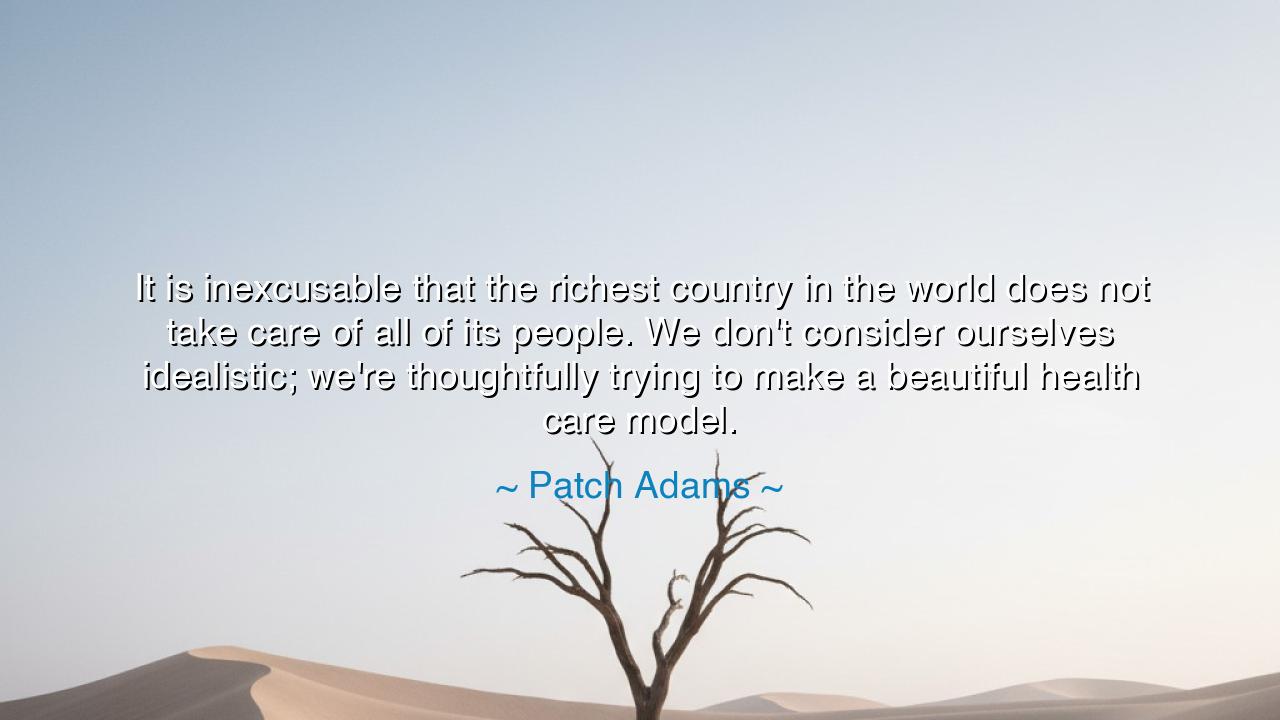
It is inexcusable that the richest country in the world does not
It is inexcusable that the richest country in the world does not take care of all of its people. We don't consider ourselves idealistic; we're thoughtfully trying to make a beautiful health care model.






The words of Patch Adams—“It is inexcusable that the richest country in the world does not take care of all of its people. We don’t consider ourselves idealistic; we’re thoughtfully trying to make a beautiful health care model.”—carry the weight of both indignation and hope, a rare combination that echoes through the halls of human history. In these lines, he speaks not only of medicine but of justice, reminding us that wealth and power are meaningless if they do not serve the welfare of all. His voice is the voice of conscience, calling forth a civilization to measure its greatness not by gold, but by compassion, and to recognize that health is a human right, not a privilege.
Patch Adams’ words strike at the heart of a moral paradox: the nation abundant in resources yet blind to the suffering within its own borders. It is “inexcusable” because the wealth of a country should translate into the care of its people, into the protection of life itself. The ancients understood this principle intuitively. Plato, in his Republic, argued that a state’s legitimacy derives from its ability to provide for the needs of all its citizens, not only the powerful. Similarly, Adams’ indignation is rooted in a timeless understanding that a society’s value is measured by its treatment of the most vulnerable. Wealth without justice is a hollow crown.
The origin of this quote lies in Patch Adams’ life and philosophy. A physician, clown, and social reformer, Adams has spent decades challenging the conventional model of healthcare. He believes that healing is not a transaction, but a human exchange—a bond of empathy and laughter between doctor and patient. In his words, “beautiful health care” is thoughtful, creative, and attentive to the dignity of every person. His work reminds us that health is not merely the absence of disease, but the presence of care, understanding, and human connection.
History offers many parallels to Adams’ mission. Consider Florence Nightingale, who, during the Crimean War, revolutionized hospital care not only by her knowledge of sanitation but by her insistence on attention to the suffering of the individual. Her reforms transformed hospitals from places of death into places of healing. Like Adams, she did not merely treat disease—she treated the person, recognizing that compassion and structure together create a model of care that elevates society as a whole. Both lives teach that real progress in healthcare is born of thoughtfulness and courage.
Adams also reminds us that idealism and practicality are not opposed. When he says, “We don’t consider ourselves idealistic,” he highlights a truth too often forgotten: vision without execution is empty, and pragmatism without vision is cold. He seeks not mere rhetoric, but a functional model that could be implemented, tested, and replicated. The “beautiful health care model” he imagines is not a utopia of words, but a living system in which empathy, creativity, and efficiency work together. The ancients called this the harmony of means and ends, the alignment of what is possible with what is just.
The lesson in his words is timeless: to be wealthy is to bear responsibility, and to be powerful is to act with compassion. A society may possess riches, technology, and knowledge, yet if it allows any citizen to suffer, it has failed its moral obligation. Just as the kings and magistrates of ancient cities were judged by how they treated the poor, so must modern nations be judged by their care for the sick and vulnerable. Adams’ indignation is a reminder that human conscience transcends economics and policy—it is eternal.
Finally, his words call each of us to action. We may not all build hospitals or rewrite healthcare systems, but we can advocate, serve, and innovate in the spirit of his mission. To seek a “beautiful health care model” is to recognize that every effort counts, from compassion in daily life to reform at the highest level. In doing so, we honor both the individual and the collective, ensuring that care is not a privilege but a right, and that the wealth of a nation is measured in lives healed, not dollars counted.
Thus, my children, remember this eternal truth: greatness lies in service, not in accumulation. Let the wealth, wisdom, and power of your age be wielded to lift the sick, comfort the suffering, and heal the wounded. For in the end, a society’s true beauty is not in its towers or treasures, but in the health and dignity of its people—a lesson as ancient as justice itself and as urgent as the heartbeat of every patient Patch Adams has ever served.






AAdministratorAdministrator
Welcome, honored guests. Please leave a comment, we will respond soon